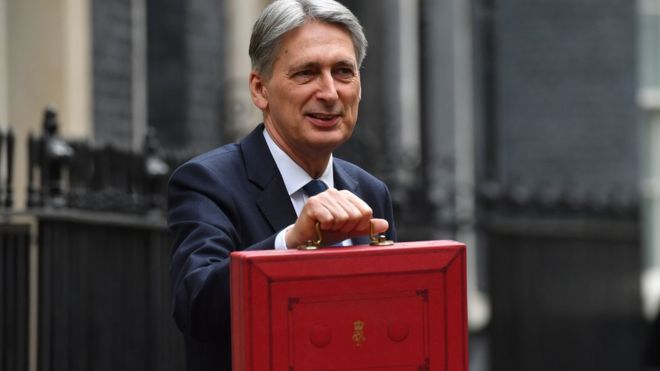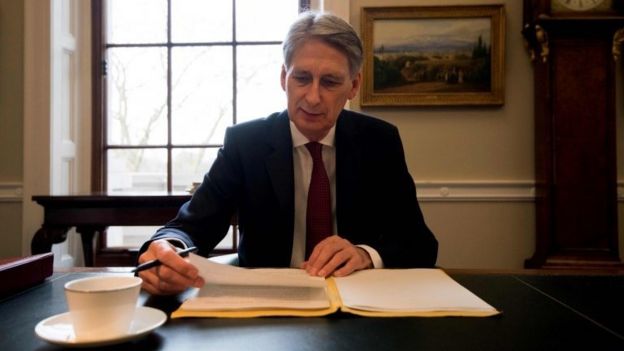Chancellor Philip Hammond will use his first Budget to help prepare Britain for a "new chapter" in its history after Brexit, the Treasury has said.

The chancellor posed with his red box before leaving Downing Street to head to Parliament
In an "upbeat" speech, he is expected to say the economy has proved resilient since the referendum but admit that many families are "feeling the pinch".
Extra money is expected for social care in England and to help firms facing steep business rate rises.
Labour demanded a break from the Tories' "failed economic policies".
With the public finances proving stronger in recent months than expected, and defying forecasts of a post-EU referendum downturn, economists say the chancellor has more room for manoeuvre than he might have expected at the time of last November's Autumn Statement.
Several spending announcements have been made ahead of the Budget statement, which begins at about 12:30 GMT in the House of Commons after Prime Minister's Questions.
These include:
- A £5m fund to mark the centenary of female suffrage next year
- An extra £500m for vocational and technical education in England
- A one-off £320m for 140 new schools in England, which could include grammars
- Measures to protect people who inadvertently end up subscribing for servicesafter signing up for free trials
- Plans aimed at helping the North sea oil and gas industry
- £500m support for electric vehicles, robotics and artificial intelligence
But Mr Hammond has distanced himself from talk of wider giveaways, stressing the need for the UK to reduce borrowing in the long term and to ensure the country is prepared for future global economic uncertainty and any short-term turbulence arising from its withdrawal from the EU.
The Treasury said Mr Hammond would give an "upbeat assessment" of the UK's economic prospects and offer a "positive backdrop ahead of the start of new chapter for the country outside of the EU".
It suggested the chancellor's focus would be on equipping the UK to meet the challenges of a "rapidly changing economy" by ensuring every child could go to a good school and get the qualifications and skills they needed.
"He will say that in building the foundations of a stronger, fairer, better Britain, outside the EU - the government understands the concerns of those who worry about their children's ability to access the opportunities they themselves enjoyed," it said.
"He will go on to say he knows that many are still feeling the pinch, almost 10 years on from the financial crash and that the government will do everything it can to help ordinary working families to get on."
Mr Hammond received an eve-of-Budget boost when the Organisation for Economic Co-operation and Development (OECD) upgraded its forecasts for the UK's economic growth this year from 1.2% to 1.6%, although it also warned that rising inflation could soon begin to squeeze the cost of living.
In January, the Office for Budget Responsibility (OBR) reported that stronger than forecast income tax, VAT and corporation tax revenues meant that borrowing was £13.6bn lower than forecast in the first 10 months of the financial year and was likely to undershoot predictions for the year as a whole.
This has led to speculation that Mr Hammond will have money to spend on key priorities, including helping cash-strapped councils meet the rising costs of social care in England, having been criticised for not making extra resources available in the Autumn Statement.
The Local Government Association says councils with responsibility for social care are facing a funding gap of £2.6bn by 2020 and the entire system stands on the "brink of collapse" without an immediate cash injection and a commitment to a long-term solution.
"The measures taken by government, such as the ability for councils to raise council tax to pay for social care, will not bring in enough funding to solve the social care funding crisis," said Izzi Seccombe, chair of the LGA's Community Wellbeing Board.
"Genuinely new government money is now the only way to protect the services caring for elderly and disabled people."
Prime Minister Theresa May has acknowledged acute pressures in social care and across the health service as a whole.
But she has rejected Labour claims that the NHS - which ministers say will receive £10bn in extra funding between 2016/17 and 2020/21 - is facing its worst financial crisis since its inception.
Mr Hammond is also expected to find money to alleviate the impact of increased business rates on many of the 500,000 firms facing them, following the government's first re-valuation of commercial property values since 2010.
Business groups have called for a hardship fund for firms facing, in some cases, increased bills of more than £1,000 a year and for more small business to be excluded entirely from having to pay rates.
The government has said the vast majority of businesses will not see their bills rise and many will actually pay less but the prime minister said last month that those set to be "particularly adversely affected" deserved assistance.
 AFP
AFP
In the run-up to Wednesday's statement, the last Spring Budget before it moves to the autumn, there has been speculation that the chancellor could pay for a boost to social care by raising national insurance rates for the self-employed.
Tobacco and some alcohol duties are also tipped to rise.
For Labour, shadow chancellor John McDonnell said the UK was "at a crossroads" ahead of Article 50 and called on Mr Hammond to deal with rising living costs.
"It cannot be a Budget, where like his predecessor, he over-claims on the government's economic record, and under-delivers on its promises," he said.
Mr McDonnell said "adequate" funding was needed for the NHS and social care, and that women should no longer "bear the brunt of Tory tax giveaways for a wealthy few".
For the SNP, Scottish Finance Secretary Derek Mackay called on the chancellor to provide some "financial relief" for struggling families and public services, and said extra spending cuts could be "disastrous".
Aside from the Budget, several previously-announced changes come into force in April, including an increase in the personal tax allowance to £11,500, a new inheritance tax allowance, a rise in the annual ISA limit to £20,000 and the introduction of a levy to fund apprenticeships.
No comments:
Post a Comment